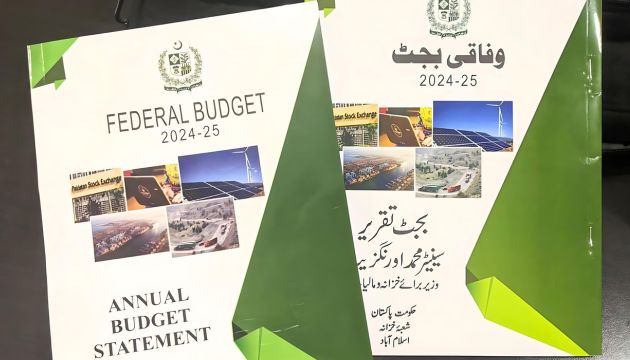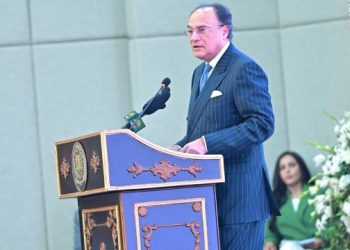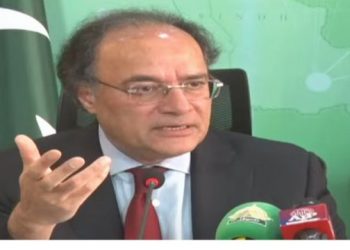ISLAMABAD: Minister for Finance and Revenue Muhammad Aurangzeb is presenting Pakistan’s budget for the fiscal year 2024-25 on Wednesday, with a total outlay of Rs18 trillion.
The National Assembly (NA) session began with the recitation of the Holy Quran, followed by the national anthem. Prime Minister is also in attendance.
According to the media report, opposition lawmakers from the Pakistan Tehreek-e-Insaf (PTI)-backed Sunni Ittehad Council stood on their desks, raised slogans against the government and PML-N president Nawaz Sharif, and even tore copies of the Finance Bill 2025.
Analysts expect the budget for the fiscal year ending June 2025 to set ambitious fiscal targets as it aims to strengthen the case for a new bailout deal with the International Monetary Fund (IMF).
In Pakistan’s economic survey on June 11, 2024, the government stated that GDP would expand by 2.4% in the current year, missing the budgeted target of 3.5%, despite revenues being up 30% year-on-year and the fiscal and current account deficits being under control.
Pakistan is in talks with the IMF for a loan estimated to range from $6 billion to $8 billion, as it seeks to avert a default for an economy growing at the slowest pace in the region.
However, a recent economic uptick following stabilization measures and falling inflation, along with an interest rate cut by the central bank on Monday, has made the government optimistic about growth prospects.
At the outset of his speech today, Finance Minister Aurangzeb said that Prime Minister Shehbaz and his team should be congratulated for their efforts over the past year to revive the economy. He vowed that Pakistan will soon be on the path of inclusive and sustainable economic growth.
“I am thankful to the leadership of the coalition partners in the government, including Nawaz Sharif, Bilawal Bhutto Zardari, Khalid Maqbool Siddiqui, Chaudhry Shujaat Hussain, Abdul Aleem Khan, and Khalid Hussain Magsi, for their guidance in the making of the 2024 budget,” Aurangzeb said.
He maintains that despite political and economic challenges, the government has made impressive progress on the economic front in the past year. He urged Pakistan to seize a new opportunity to rejuvenate its economy.
“Under the leadership of PM Shehbaz Sharif, we have followed a domestic agenda that has allowed us to address existing economic challenges and accelerate the pace of development.”
He recognized the difficulties encountered by Pakistan’s economy, including depleted foreign reserves, a 40% depreciation of the rupee, stagnant economic growth, and soaring inflation.
He praised the federal government for successfully obtaining a critical nine-month IMF program in June 2023, which prevented Pakistan from experiencing economic collapse.
“The previous IMF program was nearing its end, and securing a new deal was imperative to avert a default. I commend the government under Shehbaz Sharif for their efforts in securing the program,” he said.
The minister emphasized the substantial enhancement in economic indicators, attributing it to the efforts of the PM and his team. “With inflation at 11.8% in May, it’s a noteworthy achievement given the challenges. We’re on the correct path, and inflation is anticipated to diminish further in the forthcoming days,” he remarked.
Major Points and Announcements in Federal Budget 2024-25:
- GDP growth target set at 3.6%
- Inflation rate projected at 12%
- Development budget set at Rs1500bn
- 18% sales tax on smartphones
- Reforms to control pension expenditure
- 101% increase in development budget
- Development projects for Azad Kashmir, merged districts
- 17 major development projects
- 25% increase in salaries for BPS1-16
- 20% increase in salaries for BPS17-22
- 15% increase in pensions for retired employees
- Minimum monthly wage increased from Rs32,000 to Rs37,000
- Penalty for selling smuggled cigarettes
- Privatisation top priority
- Sales tax to be applied to various goods, services
- 5% FED proposed on new plots, residential commercial property
- Establishment of Danish schools in AJK, GB, Balochistan and Islamabad
Pakistan Federal Govt Budget 2024-25
Highlighting the budget details, Finance Minister Muhammad Aurangzeb announced that the gross domestic product (GDP) growth target for the fiscal year 2024-25 is set at 3.6%, with the inflation rate anticipated to stay at 12%.
Aurangzeb stated that the budget deficit to GDP for the period under examination is estimated to be 6.9%, while the primary surplus for the same period is forecasted to be 1.0% of the GDP.
The Finance minister stated that the Revenue collection of the Federal Board of Revenue is estimated to reach Rs12,970 billion during the upcoming fiscal year. He added that tax revenue collection during the current fiscal year saw a growth of 38%, and the provincial share would amount to Rs7,438 billion.
Muhammad Aurangzeb said that the non-tax revenue targets of the federation are fixed at Rs3,587 billion, whereas the net income of the federal government would be Rs9,119 billion.
The total expenditures of the federal government is estimated at Rs18,877 billion out of the total amount of Rs9,775 billion would be spent on interest payments.
The government has allocated Rs1,400 billion for Public Sector Development Program in its current budget, adding that an additional amount of Rs100 billion would be allocated under Public Private Partnership, he added.
This year, he said, over all development budget was the highest in the country’s history comprising Rs1,500 billion.
Meanwhile, an amount of Rs1,014 billion is also allocated for pension expenses, adding that Rs1,363 billion are allocated for the subsidy of the gas, electricity and other sectors.
The finance minister announced a 101 per cent increase in the development budget, noting that 81pc has been allocated for ongoing schemes and 19pc for new schemes.
He also announced development projects in Azad Kashmir and merged districts, adding that completion of ongoing development projects will be government’s top priority. “The government would focus on export, equity, empowerment, environment, and energy under the 5-E framework,” he added.
Aurangzeb said that 17 major development projects have been included in the budget.
The government has allocated Rs5 billion allocated for the Quaid-e-Azam Health Tower in Islamabad, Rs7bn for development projects in the poorest districts, Rs6bn for the Karakoram Highway project, Rs4bn for digitalisation of the national economy, Rs2bn for the establishment of Danish school in Islamabad and Rs5bn for the establishment of 7 Danish schools in Azad Kashmir and Gilgit-Baltistan.
Referring to the energy projects, the minister said Rs21bn has allocated for a 600 MW power plant in Jamshoro, Rs14bn for a 500 kV transmission line in Lahore, Rs18bn for the Karachi Coastal Power Project and Rs45bn for the Mohmand Dam Hydro Power Project.
The budget also includes relief measures for government employees, including: 25pc increase in salaries for BPS1-16, 20pc increase in salaries for BPS17-22 and 15pc increase in pensions for retired employees. Meanwhile, minimum monthly wage has been increased from Rs 32,000 to Rs 37,000.
The Minister recognized the challenges experienced by government employees despite economic difficulties.














